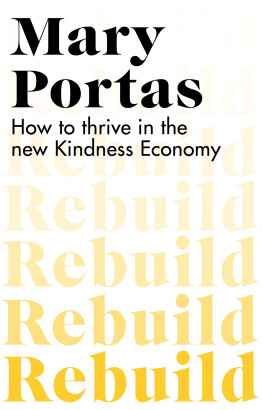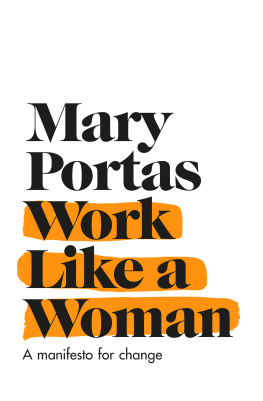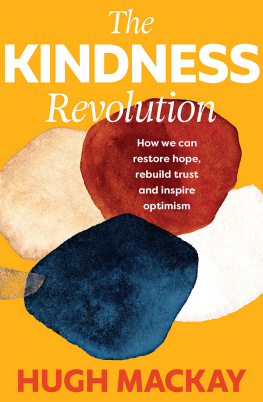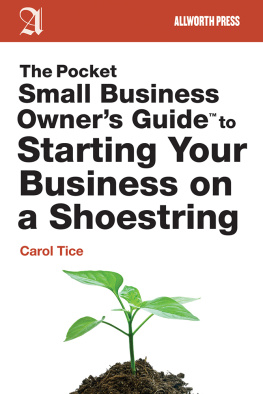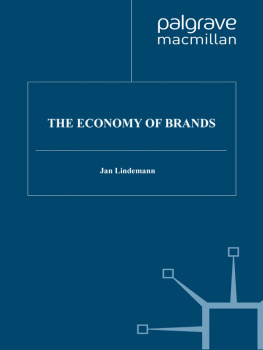Also by Mary Portas
HOW TO SHOP
SHOP GIRL
WORK LIKE A WOMAN
Mary Portas
REBUILD
How to thrive in the new Kindness Economy

TRANSWORLD
UK | USA | Canada | Ireland | Australia
New Zealand | India | South Africa
Penguin Books is part of the Penguin Random House group of companies whose addresses can be found at global.penguinrandomhouse.com.

First published by Bantam Press in 2021
Copyright M Portas LLP 2021
The moral right of the author has been asserted
Cover design by Beci Kelly/TW
Extract from Nothing Personal by James Baldwin copyright 1964 by James Baldwin. Reprinted by permission of the James Baldwin Estate. Published by Beacon Press, Boston, Massachusetts.
Every effort has been made to obtain the necessary permissions with reference to copyright material, both illustrative and quoted. We apologize for any omissions in this respect and will be pleased to make the appropriate acknowledgements in any future edition.
ISBN: 978-1-473-59515-6
This ebook is copyright material and must not be copied, reproduced, transferred, distributed, leased, licensed or publicly performed or used in any way except as specifically permitted in writing by the publishers, as allowed under the terms and conditions under which it was purchased or as strictly permitted by applicable copyright law. Any unauthorized distribution or use of this text may be a direct infringement of the authors and publishers rights and those responsible may be liable in law accordingly.
To Mylo, Verity, and Horatio. I hope this book helps make your world that little bit better
Introduction: Why Now?
Let me tell you my pandemic story. Some of it may sound familiar.
February 2020. Im just back from a work trip with my CEO at Portas Agency, Caireen. Weve been in Melbourne, Australia, where there was growing concern about a flu-like bug in China. Our Australian clients, a fashion company, were worrying about the deliveries of their next lines and what would happen if their stock didnt come in.
The first trickles of anxiety start.
Caireen and I get on the flight home no masks, no nothing and return to the office, where our finance director has a bit of a cough. We dont take much notice. Its good to be back and sharing the buzz of the trip. But the tension grows as the days turn into weeks. This flu thing just isnt going away. We can feel theres some kind of crisis coming but cant see exactly what shape it will take.
Soon, one of our team whose husband is in politics comes in and tells us that Boris Johnson, the prime minister, is going to lock down the UK. And we still cant really envisage what the crisis will look like, even though we are on the point of walking into it.
We have a last afternoon in the office, and the whole team gets together to open up the beer and wine. The mood is slightly absurd, almost end-of-term. Well be back in a month, so lets have a good drink.
We are laughing and a bit giddy. Its surreal. The atmosphere is a mix of fear and slight excitement at something so unlike anything weve known before. Its a bit of a novelty. And the weather is going to be great in April, apparently. So we all go home and go into lockdown and try to figure out how to look professional on Zoom calls.
A few days later Caireen rings me and says: OK, so our clients in the States and in Australia have stopped work.
What do you mean, stopped?
Just closed down for now. These are retail clients and they have shut their doors.
I cant process it properly. So what does that mean? What does it mean for us?
Its going to be at least a few months: they have cancelled the work we were doing for them. We need to find new ways to support them.
We start to do the maths together, and figure out we are probably going to take a 1520 per cent hit to our immediate profits. OK, we can do this. I talk to Mark, my finance director, and we look at the staff we have, our rent and contracts, and we reckon well be all right. Well be down a chunk, but all right.
Breathe. We just have to keep focus here.
Two days later another client calls, same deal. And within three weeks we go from 20 per cent down in profits through 50 per cent to lucky if we can manage to break even.
Meanwhile, Im at home with a house full of my children, old and young. In one room, my son Mylo is working from his laptop. In another my daughter Verity is doing her masters degree online. And in between Im trying to get my eight-year-old, Horatio, to do insanely complicated maths equations as part of his virtual schooling, while fielding calls about my crumbling business.
Like any mother, I keep smiling on the surface while paddling furiously underneath. But the fear is building constantly inside me. The business that weve built up over twenty-one years, thats always been profitable, that my team and I have seen through all the storms including the 2008 crash, is on the line. The question mark now is not about the profits but sheer survival.
I am completely consumed by fear. Everything Id relied on, had planned for the future, seems uncertain. Im four weeks away from my sixtieth birthday looking forward to the years when I was supposed to sit back a bit and enjoy slowing down. Just a little.
Now Im wondering if everything is going to implode. I sleep less and less. Turning restlessly in my bed as I worry about everything we have built, and my employees livelihoods, being at risk.
For the first time in my career, I feel completely and utterly at a loss. And its largely because the guiding light of my whole career, which is something I cant explain, has always been a sense of whats going to be the next thing, where people are going. Ive somehow always managed to work that out.
Ive been a fixer, too, since my mother died when I was sixteen, my father not long afterwards, and my siblings and I were cut adrift. Ive always been the one to sort things out, ride in on a white horse and save everyone. But suddenly I am completely and utterly floored. This feels too big, too unknowable. Unfixable. Like so many others, Im wondering where my life is going to land when all this ends.
The next month brings constant bad news. And the irony is that my business involves advising others on what to do next. While other agencies are putting out think pieces about what businesses should be doing, we stay uncharacteristically silent.
We dont have a ten-point plan or snappy flow chart to show people how to get out of a pandemic. We just dont know what to say. Nor do we really want to yet. And Ive always had something to say. So there I am, the weeks passing, the fear beating out of my chest, me like a pilot holding white-knuckled on to the airplane controls as I try to stop it crashing.
But slowly, so slowly in fact that I hardly realize its there, another feeling starts to unfurl inside me: a strangely peaceful kind of acceptance. I get tired of all the fear and worry. I realize that its not helping anything. No one knows how this will end. Im not failing because I cant work out what to do. Were all just surviving and Ive got to sit with it. All of us have got to lean into the pain and simply try to look after our people and business as best we can.
Every day, Caireen and I talk as we learn together how to be in this new reality. And as we do, there is one thing that keeps coming to the forefront of our minds, an idea weve been exploring over the last couple of years almost as a side hustle. We call it the Kindness Economy and it follows on from thinking I laid out in a book called

